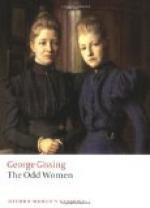It was worth thinking about, but in the meantime he wanted to see much more of Rhoda Nunn. Rhoda he was beginning to class with women who are attractive both physically and mentally. Strange how her face had altered to his perception since the first meeting. He smiled now when he beheld it—smiled as a man does when his senses are pleasantly affected. He was getting to know it so well, to be prepared for its constant changes, to watch for certain movements of brows or lips when he had said certain things. That forcible holding of her hand had marked a stage in progressive appreciation; since then he felt a desire to repeat the experiment.
’Or if thy mistress some rich anger shows,
Imprison her soft hand, and let her rave—’
The lines occurred to his memory, and he understood them better than heretofore. It would delight him to enrage Rhoda, and then to detain her by strength, to overcome her senses, to watch her long lashes droop over the eloquent eyes. But this was something very like being in love, and he by no means wished to be seriously in love with Miss Nunn.
It was another three weeks before he had an opportunity of private talk with her. Trying a Sunday afternoon, about four, he found Rhoda alone in the drawing-room; Miss Barfoot was out of town. Rhoda’s greeting had a frank friendliness which she had not bestowed upon him for a long time; not, indeed, since they met on her return from Cheddar. She looked very well, readily laughed, and seemed altogether in a coming-on disposition. Barfoot noticed that the piano was open.
‘Do you play?’ he inquired. ’Strange that I should still have to ask the question.’
‘Oh, only a hymn on Sunday,’ she answered off-hand.
‘A hymn?’
’Why not? I like some of the old tunes very much. They remind me of the golden age.’
‘In your own life, you mean?’
She nodded.
’You have once or twice spoken of that time as if you were not quite happy in the present.’
’Of course I am not quite happy. What woman is? I mean, what woman above the level of a petted pussy-cat?’
Everard was leaning towards her on the head of the couch where he sat. He gazed into her face fixedly.
’I wish it were in my power to remove some of your discontents. I would, more gladly than I can tell you.’
‘You abound in good nature, Mr. Barfoot,’ she replied laughing. ’But unfortunately you can’t change the world.’
’Not the world at large. But might I not change your views of it— in some respects?’
’Indeed I don’t see how you could. I think I had rather have my own view than any you might wish to substitute for it.’
In this humour she seemed more than ever a challenge to his manhood. She was armed at all points. She feared nothing that he might say. No flush of apprehension; no nervous tremor; no weak self-consciousness. Yet he saw her as a woman, and desirable.




